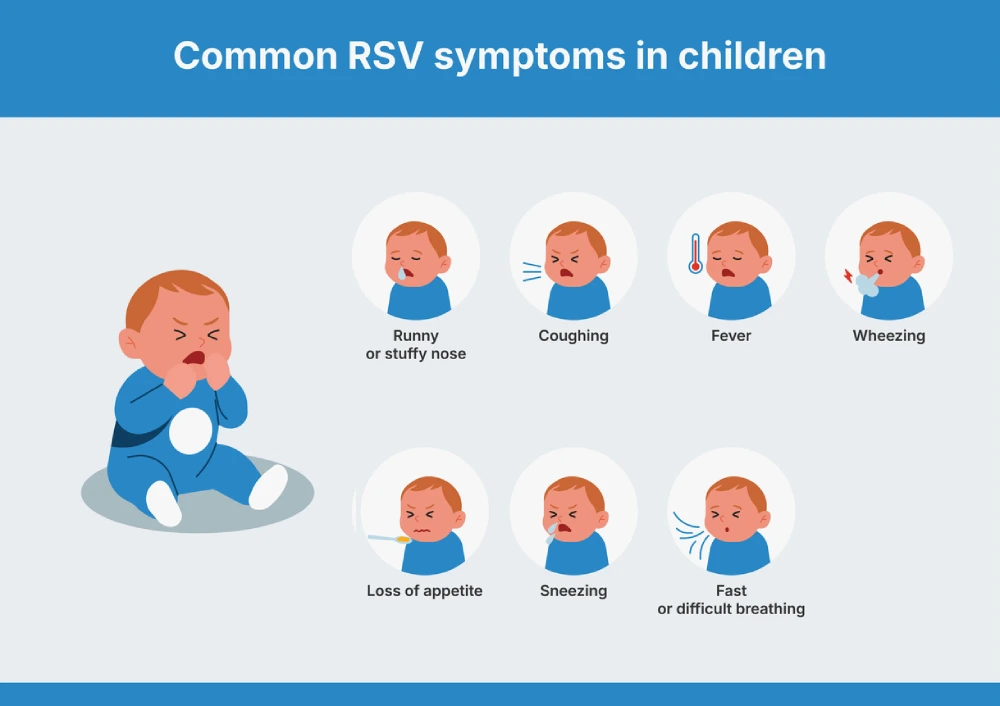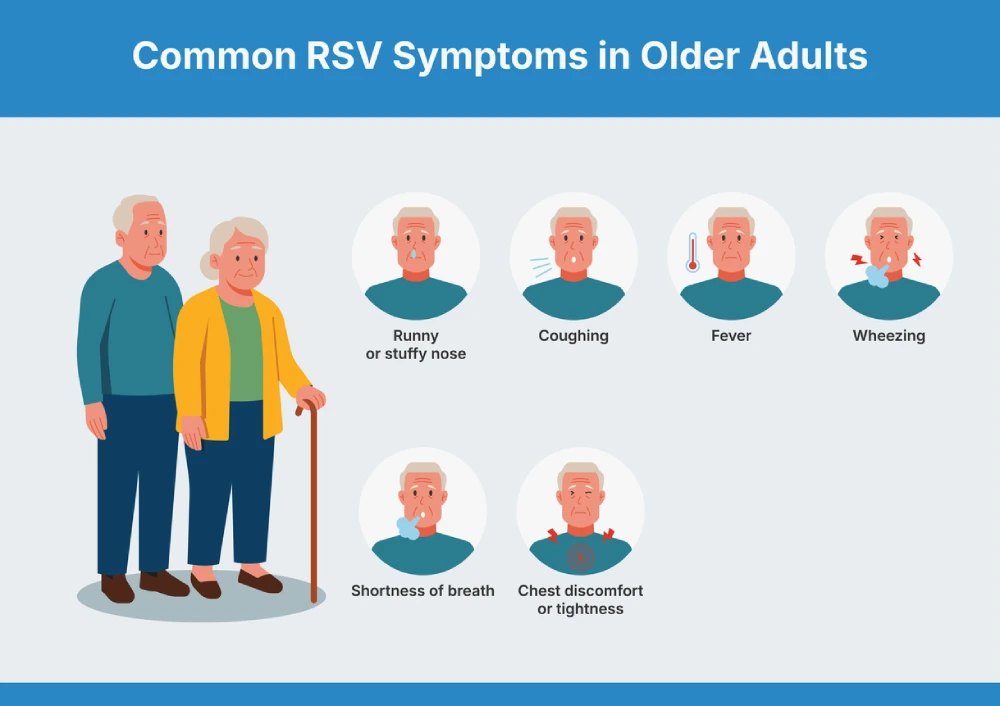Each year, RSV season arrives in Canada from late fall through early spring, bringing higher rates of respiratory illness across communities.
While many people mistake RSV for a typical cold, this virus can lead to serious complications in infants, older adults, and anyone with weakened immunity.
Understanding what RSV is, how it spreads, and the steps you can take to prevent infection is essential to protecting your household.
In this article, we explain how RSV differs from a common cold, outline key RSV symptoms, describe treatment options for every age group, and share proven prevention strategies.
You will also learn when to seek medical help and how your local PharmaChoice pharmacist can support you throughout the season.
RSV vs. Common Cold – What You Should Know
Before exploring symptoms and treatment, it is important to understand the viruses themselves.
Respiratory Syncytial Virus (RSV) infects the lungs and airways, and is common enough that most children will experience it before the age of two. While healthy adults often recover easily, RSV can progress to bronchiolitis or pneumonia in high-risk groups.
By contrast, the common cold is a mild upper respiratory infection caused by several different viruses, most often rhinoviruses. It stays in the nose and throat, and though unpleasant, rarely results in serious lung complications.
These differences highlight why identifying RSV early matters, especially when caring for infants or seniors.
RSV Symptoms vs. Cold Symptoms
Recognizing key symptom patterns helps you decide when to seek care. Both illnesses begin with upper respiratory discomfort, but RSV is more likely to progress to the lower lungs, especially in children and seniors.
The National Foundation for Infectious Diseases highlights the difference in symptoms between RSV and the common cold.
Typical RSV Symptoms
- Runny nose
- Persistent cough
- Mild to moderate fever
- Wheezing or noisy breathing
- Decreased appetite
These symptoms typically last for one to two weeks.
Typical Common Cold Symptoms
- Sneezing and nasal congestion
- Runny nose
- Mild cough
- Sore throat
- Body aches or headaches
- Fatigue
The typical duration of cold symptoms is seven to ten days.
According to the Government of Canada, infants may show additional warning signs such as irritability, difficulty breathing, poor feeding, or reduced activity. These differences mean that even a “simple cold” in a baby deserves careful observation.
How RSV & Colds Spread And When Symptoms Begin
RSV and common cold viruses both rely on close human contact to spread, but subtle differences affect how quickly illness develops. Understanding these timelines can help you take precautions and know when to watch for early signs.
RSV typically incubates for 2-4 days before symptoms appear, while the common cold often develops within 2-3 days of exposure. This longer window means someone carrying RSV can unknowingly pass it to others. Transmission occurs when:
- Respiratory droplets are released during coughing or sneezing
- Contaminated hands or surfaces like toys or door handles are touched before touching your eyes, nose, or mouth
- Close personal contact, such as kissing a baby or sharing utensils
Because RSV can survive on surfaces for hours, frequent handwashing and disinfecting high-touch items are essential preventive habits.
Who Faces the Greater Risk – Babies vs. Adults
Not everyone experiences RSV the same way. Infants under six months of age are at the highest risk, as their narrow airways can quickly become inflamed, leading to serious breathing problems. Premature babies or those with congenital heart disease or chronic lung conditions are particularly vulnerable.
When it comes to adults, people over 60, especially those with chronic heart or lung disease, and individuals with weakened immune systems, may experience complications that require hospitalization. Conditions like asthma or COPD can worsen after an RSV infection.
By understanding these risk profiles, families and caregivers can prioritize prevention measures and seek timely medical care when needed.
When to Seek Medical Help for RSV
Early medical evaluation can prevent severe outcomes. We encourage everyone to monitor symptoms carefully and contact a healthcare provider immediately if any of these signs appear:
- Difficulty breathing, fast breathing, or wheezing
- High or persistent fever
- Dehydration, such as very few wet diapers in infants or dark urine in adults
- Unusual sleepiness, lethargy, or difficulty waking
- Repeated vomiting or symptoms that worsen after a few days
For infants, additional emergency warning signs include chest retractions (skin pulling between the ribs), a blue or grey tint to lips or skin, and refusal to feed. Prompt medical attention can save lives.
Testing and Diagnosis Options for RSV & Cold
While many cases are diagnosed clinically, laboratory testing provides clarity when symptoms overlap with other illnesses like influenza or COVID-19. Your healthcare provider may recommend:
- PCR or other nucleic acid amplification tests (NAATs) for the most sensitive and accurate detection, often used for infants, older adults, or people at higher risk
- Antigen tests, which give faster results but may be less sensitive in adults
- Combination respiratory panels capable of detecting multiple viruses, helping guide treatment decisions for flu or COVID-19
Testing is especially valuable when results could influence clinical care, such as determining eligibility for antivirals in confirmed flu or COVID cases.

RSV Treatment
Treatment focuses on symptom relief and supporting recovery since RSV is a viral infection. Most people improve within one to two weeks.
RSV Treatment for Adults
For healthy adults, supportive care is the cornerstone. This may include:
- Staying well hydrated to thin mucus and prevent dehydration
- Getting adequate rest to allow the immune system to fight the infection
- Taking acetaminophen or ibuprofen to manage fever or discomfort, following package directions or pharmacist guidance. Our Option+ products offer effective, budget-friendly choices
Antibiotics have no role in treating RSV because it is caused by a virus.
RSV Treatment in Infants (<8 months)
Infants need close observation and gentle, supportive care:
- Offer small, frequent feedings to maintain hydration and energy
- Use saline drops with gentle suction to clear nasal passages and ease breathing
- Keep the infant’s airway clear and monitor breathing for any rapid or laboured patterns
- A cool-mist humidifier can soothe airways and reduce congestion
Over-the-counter cough or cold medicines should never be used in babies unless specifically prescribed by a healthcare provider.
RSV Treatment in High-Risk Individuals
Older adults and people with chronic illnesses should take extra precautions:
- Maintain adequate fluid intake and rest to support the immune response
- Use over-the-counter fever reducers such as acetaminophen or ibuprofen for comfort
- Consider humidified air or steam inhalation to ease congestion

RSV Prevention Habits That Reduce Spread
Prevention protects families and relieves pressure on Canada’s healthcare system. RSV activity generally peaks from November to April, making this the time to stay vigilant.
Everyday Hygiene and Behaviour
Simple habits significantly cut transmission risk:
- Wash your hands frequently with soap and warm water for at least 20 seconds
- Clean high-touch surfaces like phones, doorknobs, and toys every day
- Cover coughs and sneezes with a tissue or the inside of your elbow
- Stay home when sick and avoid close contact with vulnerable individuals
Extra Protection for Infants and Young Children
For babies and toddlers, household infection control is critical:
- Limit visitors during peak RSV season, especially anyone with cold symptoms
- Continue breastfeeding if possible to provide natural antibodies
- Keep indoor spaces smoke-free to reduce airway irritation
- Ensure all routine childhood immunizations are up to date
Passive Immunization Options
According to Immunize Canada, there are two main medications that offer passive protection for infants: nirsevimab and palivizumab.
- Nirsevimab: A single dose given before RSV season, providing up to five months of protection for all infants under six months and high-risk babies
- Palivizumab: Monthly doses during RSV season for specific high-risk infants
- Adult RSV Immunization: For people 50-74 years old, there are a few single-dose immunizations available that can be administered to help reduce risk in older adults. Talk to your PharmaChoice pharmacist to learn more about these options and eligibility.
These are preventive measures and do not treat active infection.
Maternal Vaccination
Pregnant individuals can also receive a vaccine that can provide added protection. The RSVpreF vaccine is typically given between 32 and 36 weeks of gestation and protects newborns for approximately six months after birth.
How Your Local PharmaChoice Pharmacist Can Help
Your PharmaChoice pharmacist is a key partner in RSV prevention and care. We provide:
- Personalized guidance on symptom management and when to see a doctor
- Advice on selecting over-the-counter medications, including proper dosing for all ages
- Support with tools such as saline sprays, humidifiers, and thermometers to make home care easier
- RSV vaccinations based on provincial guidelines
Protect Your Family This RSV Season
RSV may resemble a common cold at first, but its potential to cause serious illness, especially in infants, older adults, and people with chronic conditions, makes early recognition and prevention essential.
Staying alert to symptoms, practicing thorough hygiene, and using proven preventive tools can greatly reduce risk.
For personalized guidance and trusted support, visit your local PharmaChoice pharmacy. Our knowledgeable pharmacists can help you choose effective over-the-counter products, answer your questions, and provide advice to keep every member of your household safe throughout RSV season.





